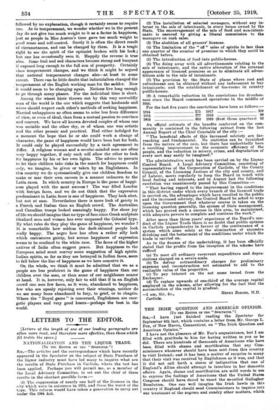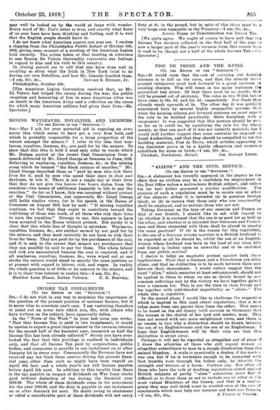THE IRISH QUESTION AND AMERICAN OPINION. [To THE EDITOR OF THE " EPECTATOR."1
Sna,—I have just finished reading the Spectator for September 6th last, which contains a letter from Mr. George L. Fox, of New Haven, Connecticut, on " The Irish Question and American Opinion."
I have not the pleasure of Mr. Fox's acquaintance, but I am filled with gratitude to him for having written to you as he did. There are hundreds of thousands of Americans who have been filled with shame and mortification that any Commissioners whatever should have been sent from this country to visit Ireland; and it has been a matter of surprise to many that their visit was received by Englishmen as it was, and that it did not call forth a storm of indignation that one of England's Allies should attempt to interfere in her domestic affairs. Again, shame and mortification are mild words to use to express the feelings of Americans that the United States Congress should have dared to enact the so-called Gallagher Resolution. One can well imagine the Irish howls in thin country if Fn gland should send Commissioners to inquire into our treatment of the negroes and sundry other matters, which
may well be looked on by the world at large with wonder. Every word of Mr. Fox's letter is true, and exactly what hosts of us over here have been thinking and feeling, and it is well that the English people should know it.
I do not know what American papers you may see. I enclose a clipping from the Philadelphia Public Ledger of October 5th, 1919, giving some account of a meeting of the American Legion held recently. The action taken at that meeting in reference to one Eamon De Valera thoroughly represents our feelings in regard to him and his visit to this country.
In closing permit me to add that you have done well in recalling so often what the Irish in New York tried to do during our own Rebellion, and how Mr. Lincoln handled them.
—I am, Sir, &c., EDWARD S. BUCKLEY, Jr. Philadelphia, October 6th.
[The American Legion Convention resolved that, as Mr. De Valera had helped the enemy during the war, the public reception and honouring of him in some American cities was an insult to the American Army and a reflection on the cause for which many American soldiers had given their lives.—En. Spectator.]











































 Previous page
Previous page